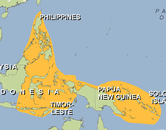Today’s warning from the IUCN of a mass global extinction unseen for 65 million years underpins the need for more urgent protection of the world’s ‘nursery grounds’, such as the Coral Triangle, on which species critical to the livelihoods of millions of people depend for essential habitat.
The Coral Triangle spans Malaysia, Indonesia, the Philippines, Papua New Guinea, the Solomon Islands and Timor Leste, and contains 75 per cent of the world’s coral species, as well as critical spawning grounds for globally valuable species such as reef fish and tuna.
The IUCN has for the first time assessed all 161 species of grouper, a reef fish which makes up a large part of the Coral Triangle’s lucrative live fish trade. Twenty grouper species were assessed as threatened with extinction, including the squaretail coral grouper and humpback grouper, which are found throughout the Coral Triangle and are a popular luxury live food in Asian seafood restaurants.
“The huge demand for live reef fish amongst wealthy consumers in China and in Chinese communities around the world is a major contributor to the overfishing of these species,” said Geoffrey Muldoon, programme leader for WWF’s live reef fish work in the Coral Triangle.
“The squaretail coral grouper is an example of a species that cannot currently be farmed and therefore all fish are caught from the wild. In order for operators to meet increasing demand, many are resorting to targeting spawning aggregations, many of which are now disappearing from the Coral Triangle.”
Resource depletion rates in the Coral Triangle are high and accelerating due to the explosive growth of Asian fish markets and the insatiable demand for tuna and shrimp in the US, Europe and Japan.
Local demand for food and space is also adding to global pressures and enhancing the risk of instability and insecurity. This is further compounded by the impacts of climate change and destructive fishing techniques, such as the use of explosives or cyanide to catch reef fish.
“Coastal development, destructive fishing and overfishing, unsustainable tourism and climate change are taking a heavy toll and, if left unchecked, will cause the collapse of the world’s most remarkable coral reef ecosystem,” said Dr Lida Pet Soede, head of WWF’s Coral Triangle Programme.
“The implications of loss of habitat and natural resources in the Coral Triangle are enormous in terms of the impact on ocean life globally and on regional livelihoods. This ‘nursery of the seas’ supports global populations of turtles and tuna, while 180 million people depend on its coasts and coastal resources for food security.”
The IUCN also lists other Coral Triangle species at risk of extinction, such as green turtles (Endangered), hawksbill turtles (Critically endangered) and scalloped hammerheads (Near threatened).
Another report released today by the United Nation’s Environmental Programme further emphasises the need for greater focus on the conservation of marine areas.
The Annual Report on Protected Areas: A review of Global Conservation Progress in 2007 shows that the world’s nations are a long way off meeting their protected area targets, and that marine areas are especially poorly protected.
“The Coral Triangle is the world’s centre of marine life, on a par with the Amazon Rainforest or the Congo Basin in terms of its importance to life on Earth. We need to recognise that the same level of threat exists in our oceans as it does on the land,” said Dr Pet Soede.
WWF’s Coral Triangle Programme has goals for 2020 of protecting 10 per cent of priority coral reefs in the region, zero decline in sea turtle populations from 2007 levels, and reversing the degradation of the area’s marine resources, including turtles, tuna and reef fish.














